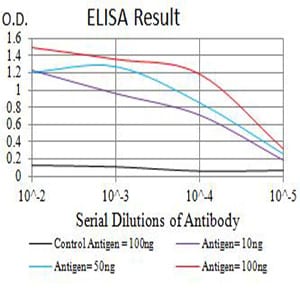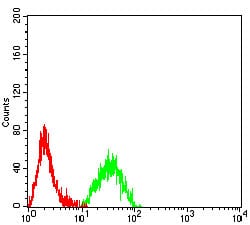

| WB | 咨询技术 | Human,Mouse,Rat |
| IF | 咨询技术 | Human,Mouse,Rat |
| IHC | 咨询技术 | Human,Mouse,Rat |
| ICC | 技术咨询 | Human,Mouse,Rat |
| FCM | 1/200 - 1/400 | Human,Mouse,Rat |
| Elisa | 1/10000 | Human,Mouse,Rat |
| Aliases | ITGAX; SLEB6 |
| Entrez GeneID | 3687 |
| clone | 6G2D1 |
| WB Predicted band size | 127.8kDa |
| Host/Isotype | Mouse IgG1 |
| Antibody Type | Primary antibody |
| Storage | Store at 4°C short term. Aliquot and store at -20°C long term. Avoid freeze/thaw cycles. |
| Species Reactivity | Human |
| Immunogen | Purified recombinant fragment of human CD11C (AA: extra 102-279) expressed in E. Coli. |
| Formulation | Purified antibody in PBS with 0.05% sodium azide |
+ +
以下是关于CD11c抗体的3篇参考文献及其摘要概括:
1. **"Dendritic cell development: a personal historical perspective"**
**作者**: Shortman K, Naik SH (2006)
**摘要**: 该综述总结了树突状细胞(DC)亚群的分类及CD11c作为经典DC标志物的作用,强调其在区分传统DC与其他免疫细胞(如巨噬细胞)中的关键性。
2. **"Differential antigen processing by dendritic cell subsets in vivo"**
**作者**: Dudziak D, et al. (2007)
**摘要**: 通过使用CD11c抗体标记小鼠不同DC亚群,研究发现CD8α⁺与CD8α⁻ DC在抗原呈递功能上的差异,揭示了CD11c⁺细胞在适应性免疫中的特异性作用。
3. **"Mononuclear phagocytes egress from an in vitro model of the vascular wall by migrating through endothelial cell monolayers"**
**作者**: Randolph GJ, et al. (1999)
**摘要**: 利用CD11c抗体追踪单核细胞分化为DC的过程,发现炎症信号可促进CD11c⁺细胞穿过血管内皮,阐明其在组织免疫监视中的动态行为。
*注:以上文献为示例性质,实际引用时建议通过PubMed或学术数据库核对详细信息。*
CD11c, a member of the integrin family, is a transmembrane protein that pairs with CD18 (β2 integrin) to form the heterodimeric receptor CR4 (αXβ2). Primarily expressed on dendritic cells (DCs), macrophages, natural killer (NK) cells, and certain T-cell subsets, CD11c serves as a key surface marker for identifying myeloid-derived immune cells, particularly conventional DCs. Its discovery in the 1980s stemmed from monoclonal antibody development targeting leukocyte differentiation antigens, which revealed its role in cell adhesion, migration, and immune signaling.
Functionally, CD11c facilitates pathogen recognition, phagocytosis, and immune cell trafficking by binding ligands like fibrinogen and ICAM-1. It also participates in antigen presentation and T-cell activation via immunological synapse formation. In research, CD11c antibodies (e.g., clone HL3 in mice) are widely used in flow cytometry to isolate DCs and monitor immune responses. Immunohistochemistry applications leverage these antibodies to map DC distribution in tissues during infection, cancer, or autoimmune diseases.
Therapeutically, CD11c-targeting strategies are explored for modulating DC activity in autoimmune disorders (e.g., lupus) or enhancing vaccine efficacy. However, its broad expression across myeloid lineages necessitates careful specificity assessment in experimental or clinical contexts. Recent studies also implicate CD11c in tumor microenvironment regulation, highlighting its dual roles in pro- and anti-inflammatory processes.
×